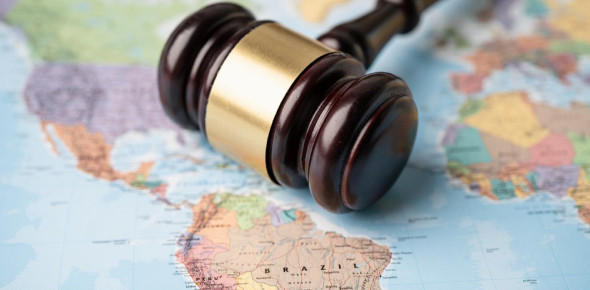Bizarre Laws Around The World Are Why It Pays To Do Your Travel Homework
As of December 2022, 62% of airfare searches are for international flights. England and Spain were the most booked European destinations for 2023.
Europe remains a sought-after choice for summer travelers. Hopper Media also reports a surge in interest in travel to Asia, indicating Americans are ready to stretch their legs. But, are they fully prepared? Preparing for overseas travel may involve more than buying plane tickets and ensuring passports aren’t expired. Laws in other countries might not always make sense, but that may not help if you unknowingly break them. In the interest of keeping vacations happy and positive experiences that don’t end in jail time or fines.

It Pays to Do Your Homework
While expecting a visitor to become an expert in a destination’s legal code isn’t reasonable, this cautionary list might help avert travel disasters. A spokesperson for StressFreeCarRental.com said: “Most tourists will not be intentionally setting out to break laws but will be unknowingly caught by unusual foreign rules they have never heard of before. Being fined for wearing high heels may seem far-fetched and downright silly, but when traveling overseas, people must accept that different cultures and opinions lead to different law-making and something legal at home could be a huge no-no abroad.”
Silly or not, here’s what might get you into trouble on your next trip abroad.
Risqué Inflatables in Malaga Spain
Coastal, sunny Malaga in the South of Spain is known for its lively nightlife, but there have been too many rambunctious visitors who’ve flirted with the line between lively and raunchy. The local government recently announced a fine of approximately $800 for guests who appear in public with clothes or accessories that represent genitals, including blow-up dolls. The same law bans wearing only undergarments in public.
This rule, approved in 2023, targets pre-wedding shenanigans, such as bachelor and bachelorette parties, so use caution when taking any racy accessories to Malaga, even if they’re only meant to be funny.
Visiting the Acropolis? Leave the High Heels at Home
Although stilettos probably won’t be the footwear of choice for a day of sightseeing in Athens, Greek law forbids wearing high heels to famous tourist attractions like the Acropolis and the Epidarus Theatre in the Peloponnese region. This rule is in place to preserve these iconic sites’ history and ancient stone ruins.
The ban, introduced in 2009, was put in place because the sharp-soled shoes were causing damage to the national treasures. Visitors to the site should wear soft-soled shoes, so pack those comfortable walking shoes, and you’ll avoid a hefty fine and be more comfortable.
Don’t Stand on Money in Thailand
Stepping on Thai currency is a crime; even accidentally standing on Thai money could get tourists a hefty jail sentence. The act is seen as disrespectful to the king because Thai notes and coins contain an image of his face. According to Thai culture, the feet are the dirtiest part of the body, and stepping on Thai currency is considered a crime violating majesty.
This crime is also punishable by up to 15 years of imprisonment, so be careful where you step.
No Selfies Allowed on the Amalfi Coast
Pausing for a selfie while on vacation might seem as natural as breathing, but that snap might get expensive if you’re visiting the Amalfi Coast. The town of Positano has introduced laws meant to reduce the number of people who linger in popular scenic areas. Stopping to take a picture often means a human traffic jam, so the practice is prohibited between 10:30 a.m. and 6:00 p.m.
Violators face a $250 fine, but the good news is those hours do allow visitors to capture stunning summer sunsets.
Mind Your Language Down Under
Swearing in public places in Australia is illegal, and if caught using foul language, offenders could be given a hefty fine. Every year in Australia, there are thousands of offensive language incidents, and thousands of dollars are taken in fines. The maximum penalty for using foul language in public in New South Wales and Western Australia is about $450, while the maximum penalty for foul language in South Australia is harsher. Swear in the South, and you’re looking at about $850 or three months imprisonment.
However, the law may not be enforced or even well-known. “I’ve never heard of that law,” says Ree Winter, an Australian-born freelance writer shares. “It sounds like the sort of thing would only be enforced if you were being a public nuisance.”
Being Drunk in a Pub: Shockingly Illegal in the United Kingdom
Even though having pints at the pub might seem a quintessentially British pastime, anyone who overdoes it will find themselves on the wrong side of the law. According to the Metropolitan Act of 1839, it is against the rule for “the keeper of a public house to permit drunkenness on-premises.” Heading to the pub and having one too many could leave pub-goers with a $250 fine.
No Public Displays of Affection in Dubai
While this United Arab Emirates city may look and feel socially progressive on the surface, Public Displays of Affection, or PDA, such as kissing, hugging, and holding hands in public, is illegal. What might seem natural and normal by Western standards could get you deported or imprisoned in Dubai, so keep the PDA behind closed doors.
Paris is for Lovers, But Not at the Train Station
One too many lengthy farewell kisses led to a 1910 French law prohibiting smooching when the train was at the station. The intent of the law was to avoid delays and reduce crowds at the train station, and while there is no formal penalty today, it is still technically against the law to kiss at the train station.
No Jaywalking in New York City
Jaywalking is defined as walking in the street or road unlawfully without regard for approaching traffic, and it is illegal in the Big Apple. Tourists who cross the road whenever they deem it safe often unknowingly break these laws and are issued fines and tickets by New York City police officers. The most common violation among pedestrians is failing to give the right of way to vehicles, walking against the traffic, and not obeying the pedestrian control signs.




